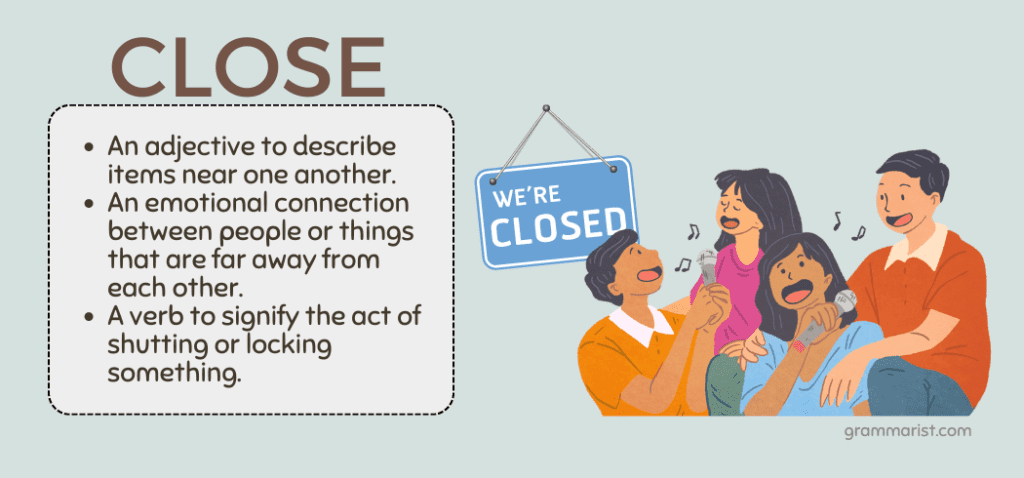Are you confused by the difference between “close” and “close”? Don’t worry – you’re certainly not alone! As non-native English speakers, it can be difficult to remember all of the subtle nuances that differentiate seemingly similar words.
In this guide, I will demystify the differences between these two terms so that you can feel confident in your understanding of when to use each word properly.
What Does Close Mean?

Close is an adjective with multiple meanings depending on the context in which it’s used. At its most basic level, close can define something near or adjacent to another object or person.
The word can also imply that an object or person is tightly bound and intertwined with another object or person – emotionally, financially, and spiritually.
It can define a connection between two people that is strong and difficult to break apart. It can define a period that has either elapsed or will soon come to pass.
Close vs. Close Meaning in English
The word “close” can be used in various ways in English. To begin, it can be used as an adjective to describe items near one another. For instance, if two chairs are close together, they are positioned so that their edges nearly touch.
Another use for the word “close” is as an adverb meaning almost or nearly; suggesting that something is not quite the same but similar. For example, two restaurants could serve the same food, but one may be close to the original recipe while the other is vastly different.
Lastly, “close” can also be used as a verb to signify the act of shutting or locking something like a door or window, thus making it inaccessible to anyone without access.
The versatility of this versatile word allows it to have numerous applications and meanings in the English language.
What Are the Two Meanings of Close?
The term “close” can mean many different things. The two most common definitions for the word refer to proximity and the state of something not being open.
It can mean a near space or time and often refers to a time when something will happen. For instance, the “closing date” is typically used when referencing an application deadline that needs to be sent by that day and time.
On the other hand, it can sometimes refer to an emotional connection between people or things that are far away from each other.
In this sense, one may feel close to someone even if they live on opposite sides of the world. This type of closeness lies in the relationship between two people and not necessarily in physical proximity.
How Do You Use the Verb Close?
The verb “close” is used in various contexts and has multiple applications. Used literally, one might use the word to describe something that has been shut or joined together in some way, such as closing a door or completing a circuit.
In finance, it can also refer to finalizing a transaction where an investor buys or sells shares at the closing price. Additionally, one might use close in reference to an end result being reached—as in coming close to achieving some goal.
Here are examples showing how to use the verb “close” in a sentence:
- Close the door, please.
- I’m going to close my eyes for a few minutes.
- The company is closing its manufacturing plant in Mexico.
- We need to close the deal by the end of the week.
- They close the store on Sundays.
Is Close a Past Tense
The past tense of the verb “close” is “closed.”
Close Homonyms Sentences
Close is both a homonym and a homograph, so it might be confusing to know how to use it properly. Here are some sentence examples:
- The door was close to being shut.
- I am close friends with her.
- He is a close relative of mine.
- The two countries are close allies.
- We live close to the school.
- Please come close so I can see you better.
- He always sits in the back row to get a good view of the board without having to sit too close to it.
- I don’t like to be too close to other people when I’m on an airplane.
- She was standing so close to me that I felt her breath on my cheek.
- We should try to get there as soon as possible, so we don’t have to park too close to the entrance.
The Final Thoughts
While “close” may seem like a simple word, it is pronounced and spelled in two different ways. It can be used as both a verb and an adjective, often confusing many people.
The word’s meaning also changes depending on how it is used in a sentence. If you’re unsure whether you’re using the word correctly, consult a dictionary or grammar guide.
